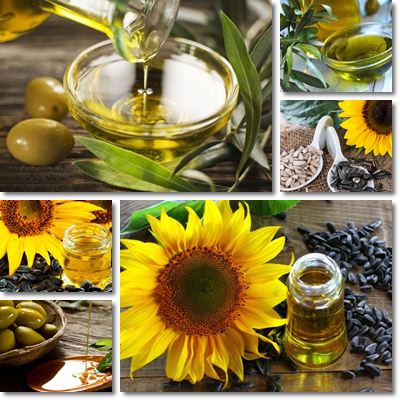Both edible cooking oils, sunflower seed oil and olive oil boast several surprisingly beneficial health effects, contributing to cardiovascular health, supporting brain function and improving skin and hair health, among other benefits.
Each oil has its own set of unique properties and contains specific nutrients, all of which dictate its main uses and health effects.
However, sunflower seed oil and olive oil are quite different from one another and it is their particularities that make them more or less beneficial for our health in certain conditions.
Which is better: sunflower oil or olive oil?
Honestly speaking, while they are both somewhat superior to most other cooking oils, neither olive oil nor sunflower seed oil is an ideal choice all the time. Extraction methods, additional refining, purity, heat exposure are some of the factors that contribute to the quality of an oil and further influence its use, properties and health effects.
When comparing sunflower seed oil and olive oil to see which is better and healthier for us, we have to analyze their properties from different perspectives and conclude which uses emphasize their benefits more.

What is the difference Between Sunflower Oil and Olive Oil?
1) Production method
Oils are generally produced either through cold pressing, meaning the seeds or fruit are crushed together until all the oil is extracted from them, or through solvent extraction, meaning harmful chemical compounds are used to extract the oil from certain seeds and fruits.
Cold pressing also implies that no heat is used when obtaining the oil, so no harmful by-products will form as a result.
The resulting oils are referred to as unrefined or cold-pressed. The most they can go through is a filtering process to filter out seed or fruit fragments.
Sunflower and olive oil obtained solvent extraction are not as healthy because this kind of processing tends to take away from the benefits of the oils, despite making them better for cooking at higher temperatures.
Moreover, refined oils may be subjected to further refining processes which may affect their fatty acids and nutrient profile or other properties to an even greater extent. Both olive oil and sunflower oil can be obtained through cold pressing and solvent extraction.
Knowing this, sunflower oil and olive oil obtained through cold pressing are healthier than their refined versions because they retain their nutritional value and keep fatty acids profiles intact.
Deciding which is better for you, cold-pressed or unrefined olive oil or sunflower oil, is a purely personal choice that has more to do with eating habits, taste preferences and individual nutritional requirements or restrictions than anything else.

2) Purity
This refers to whether or not the oil is pure olive or sunflower oil respectively, or mixed with either its refined version or other oils.
Olive oil is the most likely to suffer adulteration that impacts its purity and quality. It is popular knowledge nowadays that it is the healthiest of oils, so everyone would choose it over other oils. But because producing quality, cold pressed olive oil is more difficult and costly than producing a refined oil, cutting corners is likely.
In an attempt to make the product more accessible to consumers and, of course, increase sales and profits, it has become common for olive oil to be mixed with poor quality, refined versions, olive pomace oil and even other oils.
Experts agree that either unrefined, extravirgin olive oil or unrefined sunflower seed oil are good options for no-heat or low-heat cooking and recommend avoiding the refined varieties.
It is always best to check the label for the origin and quality of a product and, if it looks suspicious (is very cheap, has a funny color, weird smell or abnormal viscosity), go for another more reliable brand.
3) Smoke point
Normally, oils with a higher smoke point are preferred because the higher the smoke point, the more difficult it is for them to form harmful compounds when exposed to cooking heat.
Sunflower oil is believed to be a better option for cooking because it has a higher smoke point: about 230 degrees Celsius. Olive oil has a smoke point of about 190 degrees Celsius. This means that sunflower oil would withstand cooking heat better and prove less harmful for us than olive oil.
However, emerging research suggests that olive oil might actually be a better choice for cooking with heat because even though cooking heat leads to it forming potentially dangerous compounds sooner, at a lower temperature, these harmful compounds are believed to be less harmful than those formed when exposing sunflower oil to cooking heat, despite the latter’s higher smoke point.
Nevertheless, what we are not being told up front is that both varieties need to be refined in order for us to use them for high heat cooking so, in the end, it’s like choosing the lesser of two evils.
You might argue that refined oils haven’t put an end to anyone yet, but their harmful nature lies not in their immediate health effects, but in the long-term complications they produce and diseases they encourage.
This is another important aspect to ponder on when choosing our oils.
4) Fatty acids and nutritional profile
Olive oil and sunflower seed oil each have their own fatty acids and nutrient profile. For example, olive oil contains small amounts of the incredibly healthy Omega-3 fatty acids, but also Omega-9 and Omega-6 and about 25% not so healthy saturated fats.
Sunflower seed oil doesn’t have any Omega-3, but has a bewildering amount of Omega-6 (around 60%), which we still need to be healthy, though in moderate amounts, equal to our Omega-3 intake, and Omega-9.
Nevertheless, it only has about 11% unhealthy saturated fatty acids. Olive oil contains both vitamin E and vitamin K, but in small amounts (1.9 mg and 8.1 mcg). Sunflower oil contains little vitamin K (5.4 mcg), but a lot more vitamin E (41.08 mg).
So depending on what we are looking for in terms of nutrition, we may choose either olive oil or sunflower oil.
However, because refining processes may alter the oils’ fatty acids profile and heat their nutritional profile, we are still better off with cold pressed oils which we may use for not heat or low heat cooking.
5) Cooking methods employed
Very few of us actually eat our oil fresh all the time, as recommended. Whether we use cooking oils to saute our favorite vegetables, deep fry some fries, marinate some meat or brown onions for our favorite dish, heat exposure still affects their properties and may lead to the formation of potentially harmful compounds as a result, destroy important nutrients or alter the fatty acids profile.
Despite being advised to use oils with a higher smoke point such as sunflower oil for high heat cooking, it’s still not healthy, just not as bad for us as other oils which may react even worse when exposed to cooking heat. In the end, eating both sunflower seed and olive oil, cold-pressed and fresh has been agreed upon as being the healthiest for us.
Conclusion
If we are going to eat healthy, at least we should do it well. Considering the above-mentioned aspects, it would be better, for example, to consume sunflower seed oil obtained through cold pressing than refined olive oil. Similarly, despite being recommended for high heat cooking due to its more acceptable smoke point (about 230 degrees Celsius), refined sunflower seed oil is still not a good option. In the end, each and every one of us has to consider these factors and decide which is the best oil for us: sunflower seed oil or olive oil.
